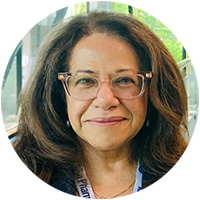Doris Nessim, BS, Phm, RPh, ACPR, MA, FCSHP, CHE | Training to Teach in Medicine
 Doris Nessim earned her Bachelor of Science in Pharmacy and Master of Arts in Health Policy and Leadership from the University of Toronto. In 2021 she completed the Safety, Quality, Informatics, and Leadership program at Harvard Medical School before joining the Training to Teach in Medicine program in 2022. Currently, she works as a pharmacist and researcher, with a focus on integrated health and social care with McMaster University, Department of Family Medicine Toronto, as well as an independent health system pharmacy consultant and change agent. Doris is dedicated to empowering future practitioners through academic education and mentorship.
Doris Nessim earned her Bachelor of Science in Pharmacy and Master of Arts in Health Policy and Leadership from the University of Toronto. In 2021 she completed the Safety, Quality, Informatics, and Leadership program at Harvard Medical School before joining the Training to Teach in Medicine program in 2022. Currently, she works as a pharmacist and researcher, with a focus on integrated health and social care with McMaster University, Department of Family Medicine Toronto, as well as an independent health system pharmacy consultant and change agent. Doris is dedicated to empowering future practitioners through academic education and mentorship.
Connection to the Program Objectives
Committed to lifelong learning, Doris sought the Training to Teach in Medicine program to gain tools in curriculum development for a research project and grant she was pursuing. She said, “The research grant involved creating a curriculum at a provincial and national level. I knew that to be successful with it, I needed to first learn educational teaching strategies and curriculum design and be able to do this on a research scale for a grant application.” Additionally, her goal was to “reach a globally diverse and dispersed audience,” which also resonated with the goals of the program curriculum.
When she decided to enroll in the program, she thought learning about curriculum design would be straightforward but found her experience a “truly transformative journey…that introduced new approaches, and in so doing, has been both inspiring and stretching.” Doris went on to say, “this program has truly exceeded my goals and expectations.”
Connection to a Like-minded Network
The Training to Teach in Medicine program is delivered in a virtual format and draws learners from around the world. The 2023 cohort had participants from 39 countries. This global cohort and team structure for completing assignments were highlights for Doris. “Aside from enriching my knowledge and ability to ‘apply and synthesize’ learning, what has been most rewarding of all is growing with my cohort, and my team, learning with them, experiencing their needs, and supporting one another personally and professionally through the learning journey, completing assignments together, experiencing a transformative change in my way of thinking, the peaks and valleys of learning, and the excitement of understanding and applying, the humility of realizing I have so much more to learn and the resilience and empathy that comes with this,” she said. These connections will be lasting as she noted, “I got to know individuals within my cohort, and we developed strong respectful relationships that I know will continue beyond the program.” Doris was a class-nominated speaker for the graduation ceremony. She mentioned that this privilege and honor by her colleagues will be one that she will always treasure.
Connection to her Initial Goal:
During the program, Doris completed a capstone project focused on writing a research grant. The grant aimed to expedite credentialing for foreign-trained health care graduates to Canada, thereby both addressing critical health care staff shortages and supporting immigrants with economic security. “Developing the Capstone occurs over a period of time, and we were given an opportunity for feedback from Harvard Faculty Reviewers so that we could evolve the Capstone and refine it further,” she explains. “Feedback on my second draft indicated to me that I was on the right track and that it was a strong paper. This gave me the confidence to tailor it to meet the requirements of the research grant.” Ultimately, her capstone project was successful, “I’m excited and thankful to share that we obtained the research grant, achieving one of my main goals for taking the program,” she said.
Doris is excited about the opportunities ahead. “Training to Teach in Medicine isn't just about curriculum design, it's a change in mindset and has been very transformative. I apply it to my research practice and my consulting career. And that brings me full circle.” In her next challenge, Doris is looking to pursue additional formal graduate studies in higher education and credits this program for validating her inspiration.
“So what it's allowed me to do is to both be effective as an educator and as a mentor and also be more effective in determining my own further education and career path…It’s been incredibly rewarding… I cannot think of a more important time to be taking Training to Teach in Medicine. It has got to be one of the most instrumental programs in guiding clinicians, leaders, researchers, and educators to know how to prepare for educating health care clinicians of the future and at a time when health care is at a crossroads as public trust in the health care system appears to be eroding. Training to Teach in Medicine gives us the toolkit we need to be able to guide, not only our own success in an empowered manner, but also that of our students and learners, and to rebuild trust that is so foundational as health care providers, educators, and leaders.”